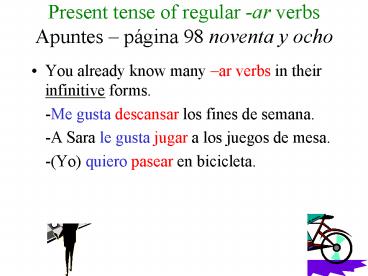Present tense of regular ar verbs Apuntes pgina 98 noventa y ocho - PowerPoint PPT Presentation
1 / 16
Title:
Present tense of regular ar verbs Apuntes pgina 98 noventa y ocho
Description:
You already know many ar verbs in their infinitive forms. ... (yo) canto (nosotros/as) cantamos (t ) cantas (vosotros/as) cant is (Ud., (Uds. ... – PowerPoint PPT presentation
Number of Views:101
Avg rating:3.0/5.0
Title: Present tense of regular ar verbs Apuntes pgina 98 noventa y ocho
1
Present tense of regular -ar verbsApuntes
página 98 noventa y ocho
- You already know many ar verbs in their
infinitive forms. - -Me gusta descansar los fines de semana.
- -A Sara le gusta jugar a los juegos de mesa.
- -(Yo) quiero pasear en bicicleta.
2
- Every verb has a stem followed by an ending. The
stem tells the verbs meaning. An infinitive
ending does not have a subject. - habl -ar
- com -er
- escrib -ir
Infinitive endings
Verb stems
3
- In English, most verbs have only two forms in the
present tense, so subject pronouns cannot be left
out. - I sing we sing
- you sing you sing
- he/she sings they sing
- In Spanish, the verb ending tells you who the
subject is.
4
- In order to give the verb a subject, you must
conjugate it. To conjugate a regular ar verb in
the present tense, drop the ar ending of the
infinitive and add these endings. Each
subject has its own ending. - (yo) canto (nosotros/as) cantamos
- (tú) cantas (vosotros/as) cantáis
- (Ud., (Uds.,
- él, canta ellos, cantan
- ella) ellas)
cantar
5
- Since most of the time the endings of the verb
tells the subject, the subject pronoun is
normally left out. Use subject pronouns to add
emphasis, or when it wouldnt otherwise be clear
who the subject is. - -Patinan ustedes mucho?
- -Ellos patinan. (Yo) nunca patino.
- Patinas (tú) mucho?
6
Present tense of regular ir jugarApuntes
página 100 cien
- The ar verbs you have learned are called
regular verbs because they have a predictable
pattern. - You learned ar verb Ts
- -o -amos
- -as -áis
- -a -an
- There are also irregular verbs which do not
follow a pattern, such as - ir to go
- voy vamos
- vas vais
- va van
7
- Por favor traduzcan (translate)
- (to) Where do you (familiar) go on Saturdays?
- -- Adónde vas (tú) los sábados?
- I go to the swimming pool.
- -- (Yo) voy a la piscina.
- How often do you (formal) go to the beach?
- -- Con qué frecuencia va (usted) a la playa?
- I always go on Wednesdays.
- --(Yo) siempre voy los miércoles.
8
- querer (e?ie) to want
- (yo) quiero (nosotros-as) queremos
- (tú) quieres (vosotros-as) queréis
- (Ud., él, ella) quiere (Uds., ellos,
ellas) quieren - When you think about stem-changing verbs in
Spanish remember to give them the boot! - NEW VERB, SAME IDEA
- jugar (u?ue) to play sport or a game
- (yo) juego (nosotros-as) jugamos
- (tú) juegas (vosotros-as)
jugáis - (Ud., él, ella) juega (Uds., ellos,
ellas) juegan -
-ar -o -amos -as -áis -a -an
9
- Por favor traduzcan (translate)
- Do you (all of you) play on the weekends?
- -- Juegan (ustedes) los fines de semana?
- No, we dont play much.
- -- No, (nosotros) no jugamos mucho.
10
- a is used after ir to mean to
- ir a to go to
- voy a vamos a
- vas a vais a
- va a van a
- -- Adónde van los domingos?
- --(Nosotros) vamos al (a el) gimnasio.
- (Ellos) van a la piscina.
- Mis amigos van al parque.
- Mi mamá va a la iglesia.
- (Yo) voy al ensayo (rehearsal).
11
- a is used after jugar with a sport
- jugar a el/la/los/las a sport/game
- juego a jugamos a
- juegas a jugáis a
- juega a juegan a
- -- Adónde van los domingos?
- --(Nosotros) jugamos al (a el) básquetbol.
- (Ellos) juegan al volibol.
- Mis amigos juegan al béisbol.
- Mi mamá juega al tenis.
- (Yo) juego a los juegos de mesa.
12
- Por favor traduzcan (translate)
- I play football every day.
- (Yo) juego al (a el) fútbol americano todos
los días. - My classmates play soccer with friends after
school. - Mis compañeros de clase juegan al (a el) fútbol
con amigos después de la escuela / del colegio.
13
Weather ExpressionsApuntes página 102 ciento
dos
- Many weather expressions begin with the word hace
(hacer). - hacer to do/make
-
hace
(it makes) - Qué tiempo hace hoy? ????
- What is the weather like (making)?
- Hace buen/mal tiempo. ????
- Its making good/bad weather.
- The weather is nice/bad.
14
- Its (very) hot.
- Its making (a lot of) heat.
- Hace (mucho) calor.
- Its (really) cold.
- Its making (a lot of) cold.
- Hace (mucho) frío.
- Its (really) sunny.
- Its making (a lot of) sun.
- Hace (mucho) sol.
- Its (really) windy.
- Its making (a lot of) wind.
- Hace (mucho) viento.
15
- llover (o?ue) to rain
-
llueve - nevar (e?ie) to snow
-
nieva - (to) Where do you (familiar) go when it rains?
- -- Adónde vas cuando llueve?
- When it rains, I dont go anywhere.
- -- Cuando llueve, no voy a ninguna parte.
Do not use hace with llueve
16
- llover (o?ue) to rain
-
llueve - nevar (e?ie) to snow
-
nieva - What do you do when it snows?
- -- Qué haces cuando nieva?
- When it snows, I play with my friends.
- -- Cuando nieva, (yo) juego con mis amigos.
Do not use hace with nieva































